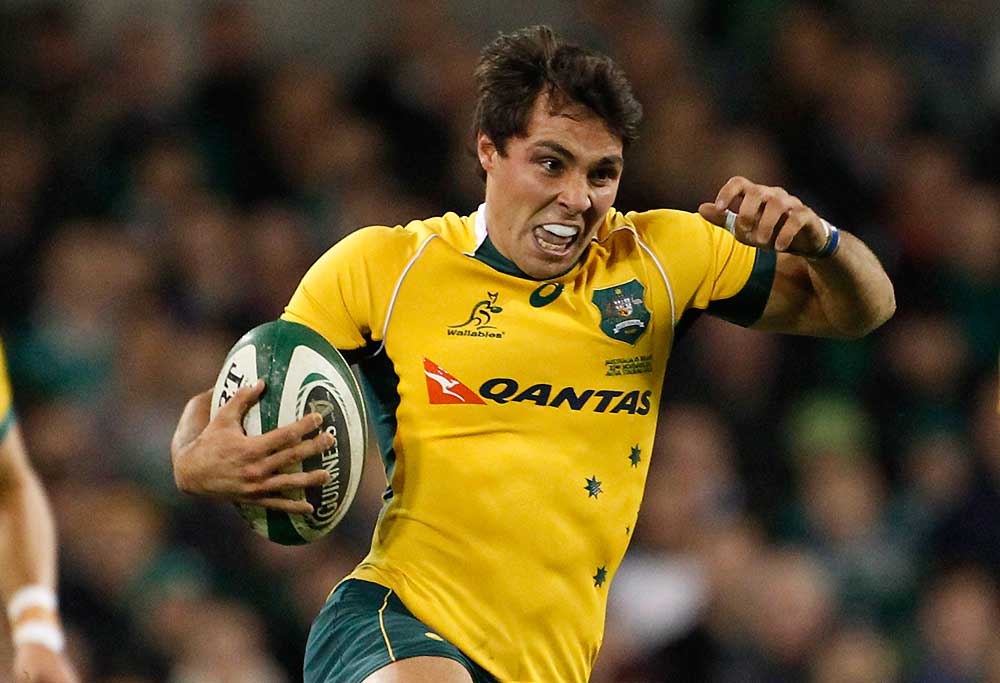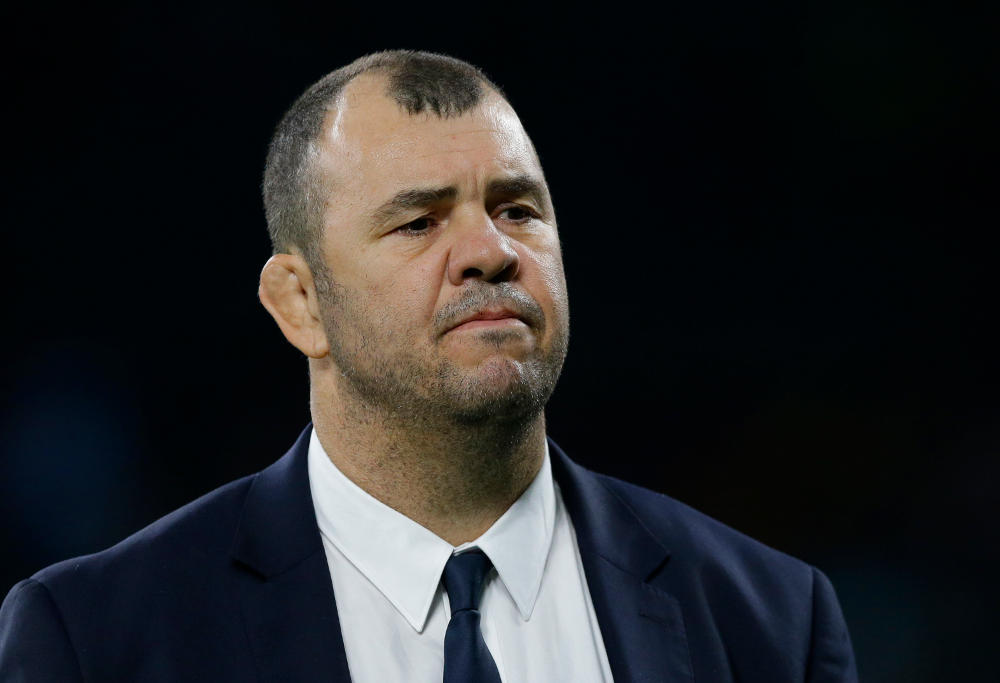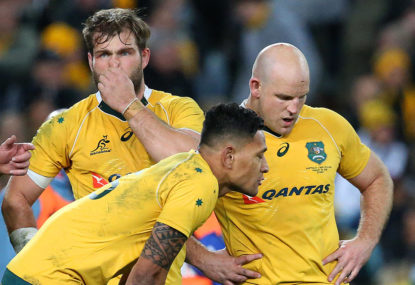For Olympic 200m swimmers it’s the third lap that counts, the gut busting push back up the pool before pure adrenaline commandeers the body for the final sprint home. For 400m runners it’s on the final bend where the race is invariably won or lost.
Racing people too, know that Australia’s championship event, the Cox Plate, is decided not at the starting gate or the finishing post, but when the pressure is applied at the school, 800m from home.
The championship third quarter. Where the Wallabies, after a first half full of endeavour and cohesive 15-man play, went missing at Twickenham. And where a formidable England, not by accident, claimed the match like they always knew it was their right to do so.
With both Michael Cheika and Eddie Jones now immortalised in print as clowns, it is Jones who ends 2016 as Krusty, and Cheika, the glum, morose Pagliacci; although to be fair, there was composure and acknowledgement in defeat this time which has not always been a hallmark of Cheika’s tenure.
In an entertaining match, worthy of far more than the vapid nonsense disingenuously dressed up as ‘mind games’ in the lead up, England fumbled and bumbled early. But once they found their rhythm in the third quarter and choked Australia out of the game, there was only ever going to be one result.
Australia made good use early of the second man play in the backline, exposing Marlon Yarde to Sefanaia Naivalu’s willingness to run hard and fast. It was a sign that the Wallabies had their rapid recycle game working although, unlike Wales, who were unable to lay a finger on them for the first half, England gradually worked out how to slow matters down.
Australia’s tactical naivety and unwillingness to vary their play with precise kicking was once again exposed. The idea that this type of high-octane, recycle game can be kept up, mistake free, for 80 minutes against quality opposition is a fallacy; even more so when it has already been tried three times this year against the same opponent and been found wanting each time.
In that respect halfback Nick Phipps was taught a lesson in game management by his opposite Ben Youngs; in tandem with the ascendancy of the England pack after halftime, the telling difference between the sides.
Phipps was a little unlucky in the lead-up to England’s opening try. Prevented from passing from the ground by a lingering Mako Vunipola, he chose the worst of three options available to him. He passed to a slow man in a worse position than him instead of tucking the ball under this wing and taking the tackle or choosing the George Gregan option of ‘accidentally’ passing into the prone English prop.
Perhaps more concerning for Cheika though, was Israel Folau’s reluctance to put his body on the line and dive onto the loose ball, opening a window for Jonathan Joseph to toe through and ultimately score.
Phipps was also at fault for England’s third try, buying an outrageous dummy from Youngs; although to be fair, at least he had his face to the play, not his back, like some of his colleagues.

Wallabies fans crying foul over England’s second try, Yarde beating Folau to the touch from a Joseph grubber, are merely straw clutching. Anyone able to recall when they ran and dived onto a bouncing ball for a try should understand (front rowers feel free to ask others what it is like).
The notion that this always happens without some minuscule degree of separation, which might get picked up in a frame-by-frame dissection, is nonsense. Yes there was separation from Yarde’s left hand, but in any event it was only a minute shift of the ball into his right hand, which simultaneously forced it down.
At normal speed, even in regular slow motion, this is a try every day of the week. I’d suggest that those who would have the game adjudicated from freeze frame to freeze frame are either looking for excuses or else would have rugby taken down a path it simply doesn’t need to go down.
The Wallabies scrum was solid enough and they showed clever innovation at line-out; Rob Simmons largely avoiding England’s defensive focus on himself and calling in David Pocock, Michael Hooper, Kane Douglas and Sean McMahon for clean takes.
But the wheels started to fall off in the third quarter; Moore throwing to nobody, as well as other all too familiar symptoms such as panic kicking from turnovers, basic handling errors, and ill discipline.
As England rose to their task, confidence visibly drained from the Wallabies.
Indeed, after the break, it took the Wallabies until the 66th minute to once again retain possession through multiple phases, which sure enough resulted in a nice break from Folau and a ‘wow’ finish by Sekope Kepu.
A lame conversion attempt by Bernard Foley and a breakdown penalty from the kick-off however quickly snuffed out any thoughts of a comeback.
Whatever the Wallabies’ failings this was a mightily impressive effort from England; Courtney Lawes in particular a commanding presence. At No.8, Lopeti Timani may have outshone Nathan Hughes in the first half through superior work-rate, but Hughes grew taller and stronger with each play, obliterating his opposite in the second half.
Indeed, with Billy Vunipola watching from the stands, and Maru Itoje going around for Saracens at the Bath Rec Ground, Jones must be delighted with how quickly and deeply his side has come together in the so-called post World Cup development year.
Wry observers will point out that departing the World Cup 2-3 weeks early provided him with a nice head start, while others know that Stuart Lancaster left Jones with a far more solid foundation than he was given credit for at the time.
For all the emergence of some new Wallabies players this year – Adam Coleman and Dane Haylett-Petty in particular – and Cheika’s talk about ‘finishers’, one area where Jones has it all over his adversary, as indeed does Steve Hansen, is a true 23-man strategy.
Jones’ replacements all felt like they were part of a cohesive game plan whereas, by comparison, the injection of players from the Australian bench felt more like reactive substitutions made after the match was already lost.

Post-match, Cheika lamented his side’s failure to stem England’s momentum. Which was true enough, although his observation will be worthless if he keeps playing the same losing hand.
His backline needs finessing but this is easy enough to remedy; he knows that he has the strike power to score tries. What is essential is more power from the forward pack and a more nuanced tactical kicking game.
One sure-fire way to halt England’s momentum would surely be to pin them into their own 22. Rugby has changed considerably over the years but, as a viable winning strategy, playing for field position is still as relevant as ever.
Meanwhile, there was a much needed boost for South African rugby, albeit in sevens form at the world season opening Dubai tournament. From little things, big things grow.
It was certainly a thrill a minute for fans, World Rugby referee of the year Rasta Rasivhenge disappearing backwards over an advertising hoarding in the act of signalling the winning try for Wales over Australia.
And there was an astonishing end to another quarter-final when Scotland, in a massive upset, found themselves ahead of England, and awarded a penalty with the full-time siren already sounded. Amid hooting, hollering and back-slapping, in his haste to join celebrating teammates, Scotland’s Scott Wight kicked the ball directly into touch, instead of tapping it to himself first.
The referee duly ordered play-on, Scotland lost the lineout on their own throw and, several phases later, England scored one of the cruelest tries you could ever wish to see.
From the women’s draw, New Zealand got some mild form of revenge for their Olympic Games loss to Australia; but really, nothing more satisfying than discovering who it is that’s been sleeping with your partner and meekly letting their tyres down.
One headline from the Fairfax coverage by Georgina Robinson caught the eye, Australian sevens women perform emergency physiotherapy treatment on teammate. Foolishly expecting a dramatic account of limb saving heroics, I soon discovered I had clicked on a classic case of oversell/under-deliver; “Two qualified physiotherapists tape a teammate’s leg during a break in play” a more accurate description of a nothing story.
At least the sub-editor responsible can’t be accused of falling victim to understatement, unlike the person who this week came up with a headline describing the Chapecoense football team as “unlucky”.
In other news from London, Princess Beatrice, her mind obviously on matters other than rugby, sliced Ed Sheeran’s cheek in the act of pretending to knight James Blunt. For connoisseurs of credible music this incident – a hormone charged, cocktail swilling, in-bred wielding a sharp sword in the vicinity of Sheeran and Blunt – can only be described as a missed opportunity.
It is only be a matter of time before Richie McCaw gets the call up for his knighthood; no doubt a condition of his acceptance will be that Beatrice isn’t rostered on for blade duty that day.
Meanwhile, to fill in time, Australian rugby fans can look forward to a Xmas holiday arguing the toss over the worth of Nick Phipps, James Slipper and Dean Mumm, and embolden themselves to face a new year with no ‘Pooper’.
Personally I’d like to see Bill Pulver and Brett Papworth go head to head over a Xmas bon-bon. I can forsee the cracker tearing apart, Bill reacting first to claim the little plastic toy.
To which Brett would quip “That’s worth about as much as your NRC, Bill.”
To which Bill would respond by reading out the joke, “Did you hear the one about how some naughty kids signed up for an expensive TV but didn’t have the money to pay for it so dad bailed them out… but then they complained anyway that they had the meanest dad in the world who wouldn’t give them any money…?”
Here’s to 2017! Interesting times lie ahead.































































































